Strategic HRM for La Costbucks Expansion into China: Key Issues
VerifiedAdded on 2023/04/22
|20
|7106
|297
Report
AI Summary
This report provides a comprehensive analysis of Human Resource Management (HRM) considerations for La Costbucks, an Italian coffee chain, as it expands into the Chinese market. It begins by highlighting the significant cultural differences between Italy and China, emphasizing the importance of adapting HRM practices to align with Chinese workplace norms. The report explores various organizational orientations, recommending a polycentric approach that prioritizes hiring local staff to foster organizational harmony, reduce costs, and gain government support. It also addresses potential difficulties faced by expatriate staff, ethical issues related to corporate social responsibility in China, and recommends staffing policies, training programs, and performance appraisal systems tailored to the Chinese cultural context. The report concludes by stressing the need for La Costbucks to integrate innovation into its organizational culture and leverage job rotation to enhance employee competencies. Desklib provides access to similar solved assignments and past papers to aid students in their studies.
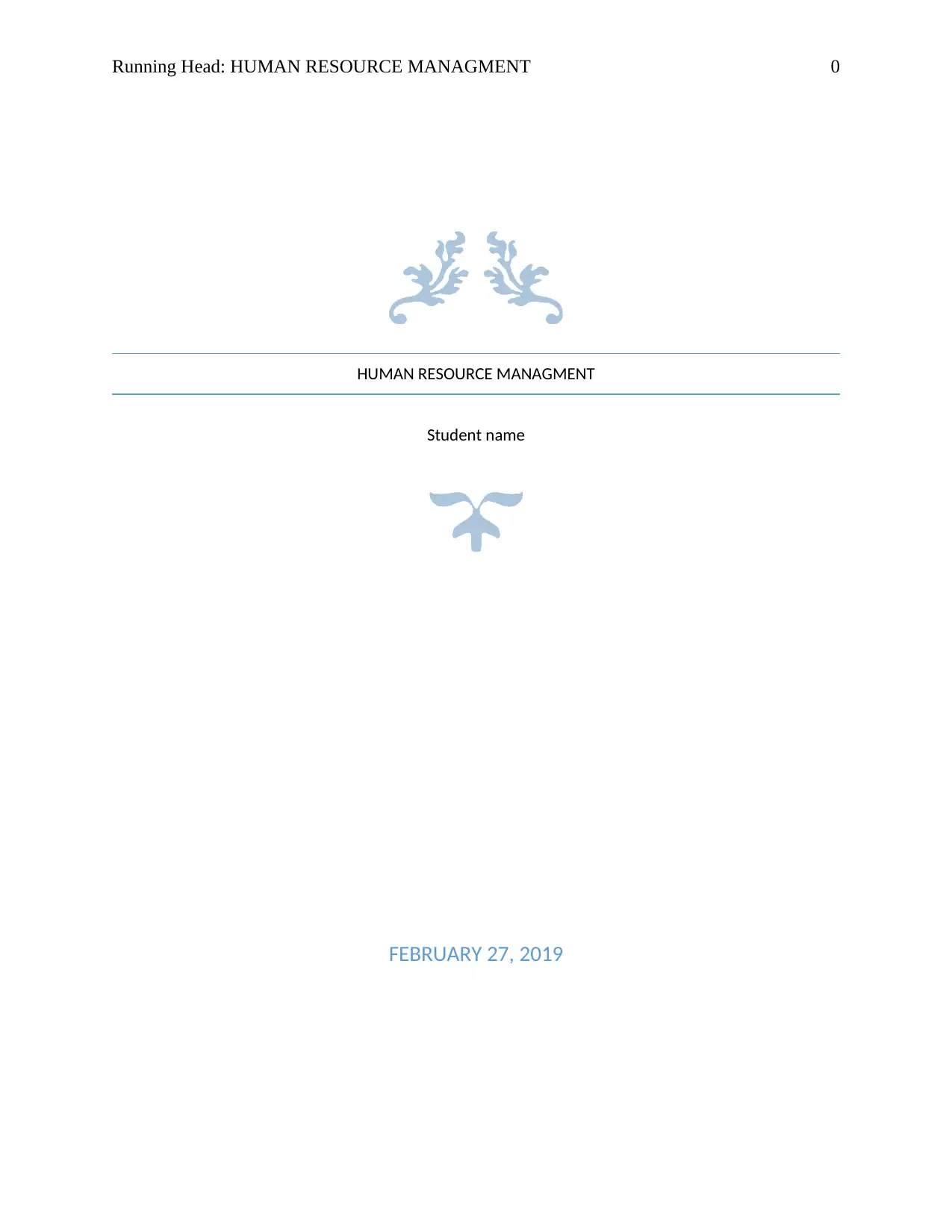
Running Head: HUMAN RESOURCE MANAGMENT 0
HUMAN RESOURCE MANAGMENT
Student name
FEBRUARY 27, 2019
HUMAN RESOURCE MANAGMENT
Student name
FEBRUARY 27, 2019
Paraphrase This Document
Need a fresh take? Get an instant paraphrase of this document with our AI Paraphraser
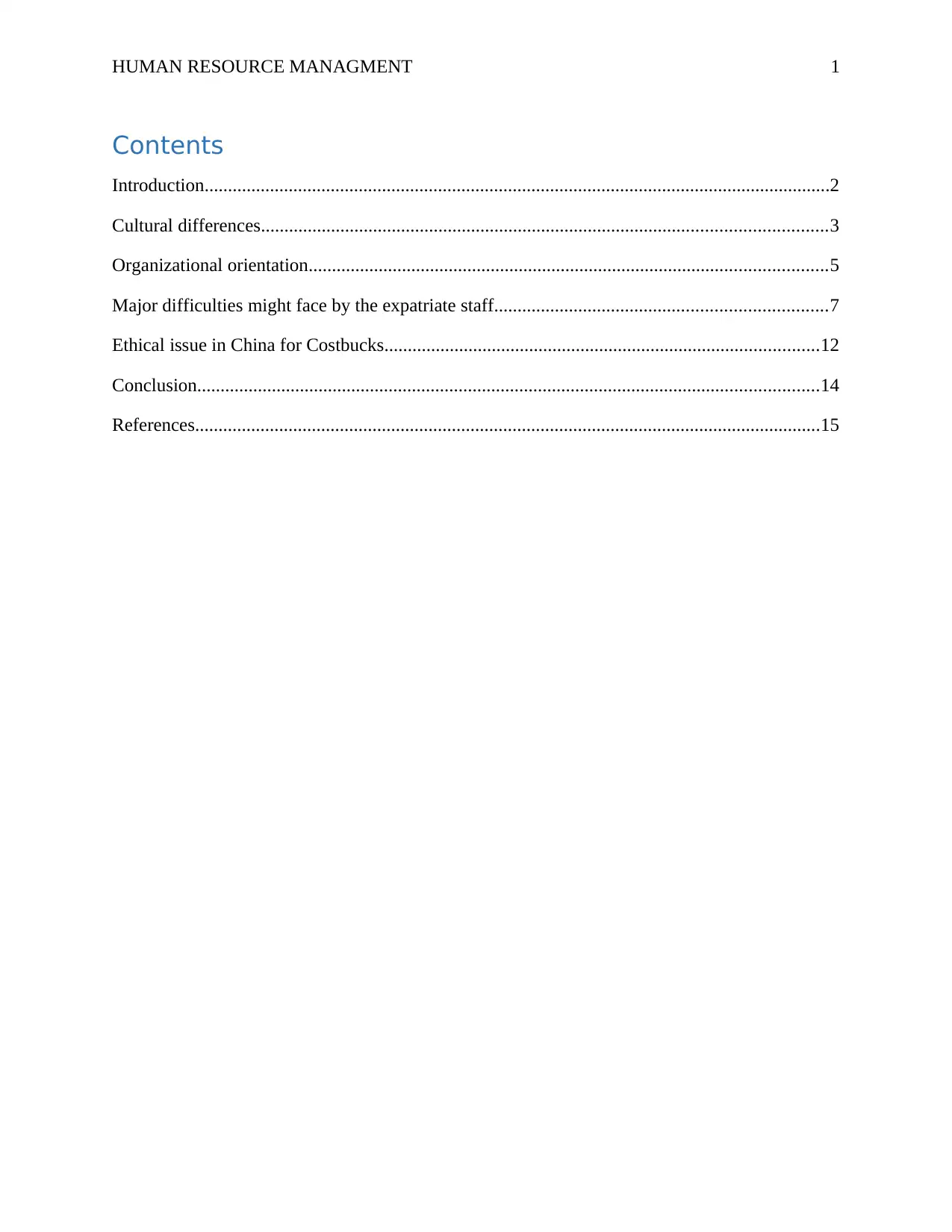
HUMAN RESOURCE MANAGMENT 1
Contents
Introduction......................................................................................................................................2
Cultural differences.........................................................................................................................3
Organizational orientation...............................................................................................................5
Major difficulties might face by the expatriate staff.......................................................................7
Ethical issue in China for Costbucks.............................................................................................12
Conclusion.....................................................................................................................................14
References......................................................................................................................................15
Contents
Introduction......................................................................................................................................2
Cultural differences.........................................................................................................................3
Organizational orientation...............................................................................................................5
Major difficulties might face by the expatriate staff.......................................................................7
Ethical issue in China for Costbucks.............................................................................................12
Conclusion.....................................................................................................................................14
References......................................................................................................................................15
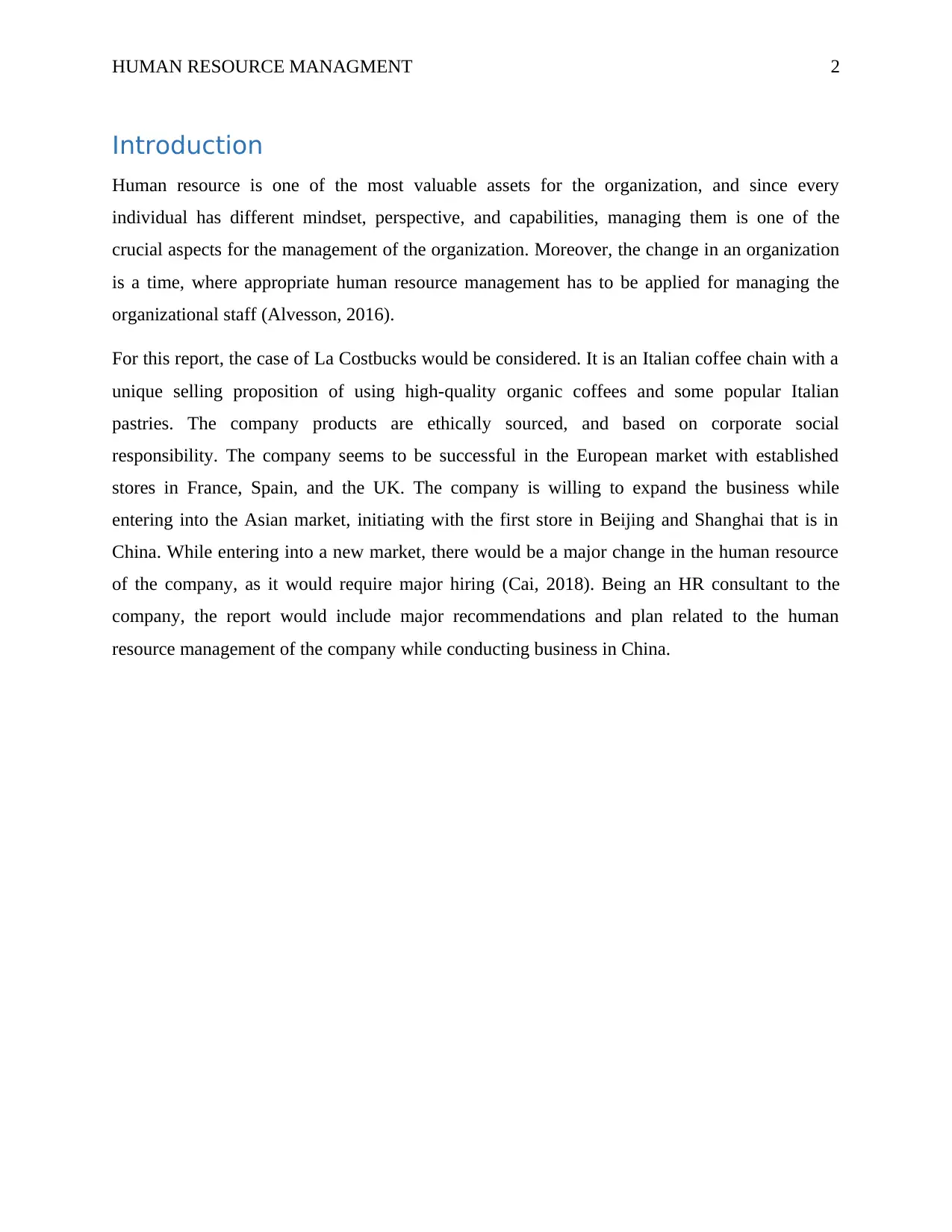
HUMAN RESOURCE MANAGMENT 2
Introduction
Human resource is one of the most valuable assets for the organization, and since every
individual has different mindset, perspective, and capabilities, managing them is one of the
crucial aspects for the management of the organization. Moreover, the change in an organization
is a time, where appropriate human resource management has to be applied for managing the
organizational staff (Alvesson, 2016).
For this report, the case of La Costbucks would be considered. It is an Italian coffee chain with a
unique selling proposition of using high-quality organic coffees and some popular Italian
pastries. The company products are ethically sourced, and based on corporate social
responsibility. The company seems to be successful in the European market with established
stores in France, Spain, and the UK. The company is willing to expand the business while
entering into the Asian market, initiating with the first store in Beijing and Shanghai that is in
China. While entering into a new market, there would be a major change in the human resource
of the company, as it would require major hiring (Cai, 2018). Being an HR consultant to the
company, the report would include major recommendations and plan related to the human
resource management of the company while conducting business in China.
Introduction
Human resource is one of the most valuable assets for the organization, and since every
individual has different mindset, perspective, and capabilities, managing them is one of the
crucial aspects for the management of the organization. Moreover, the change in an organization
is a time, where appropriate human resource management has to be applied for managing the
organizational staff (Alvesson, 2016).
For this report, the case of La Costbucks would be considered. It is an Italian coffee chain with a
unique selling proposition of using high-quality organic coffees and some popular Italian
pastries. The company products are ethically sourced, and based on corporate social
responsibility. The company seems to be successful in the European market with established
stores in France, Spain, and the UK. The company is willing to expand the business while
entering into the Asian market, initiating with the first store in Beijing and Shanghai that is in
China. While entering into a new market, there would be a major change in the human resource
of the company, as it would require major hiring (Cai, 2018). Being an HR consultant to the
company, the report would include major recommendations and plan related to the human
resource management of the company while conducting business in China.
⊘ This is a preview!⊘
Do you want full access?
Subscribe today to unlock all pages.

Trusted by 1+ million students worldwide
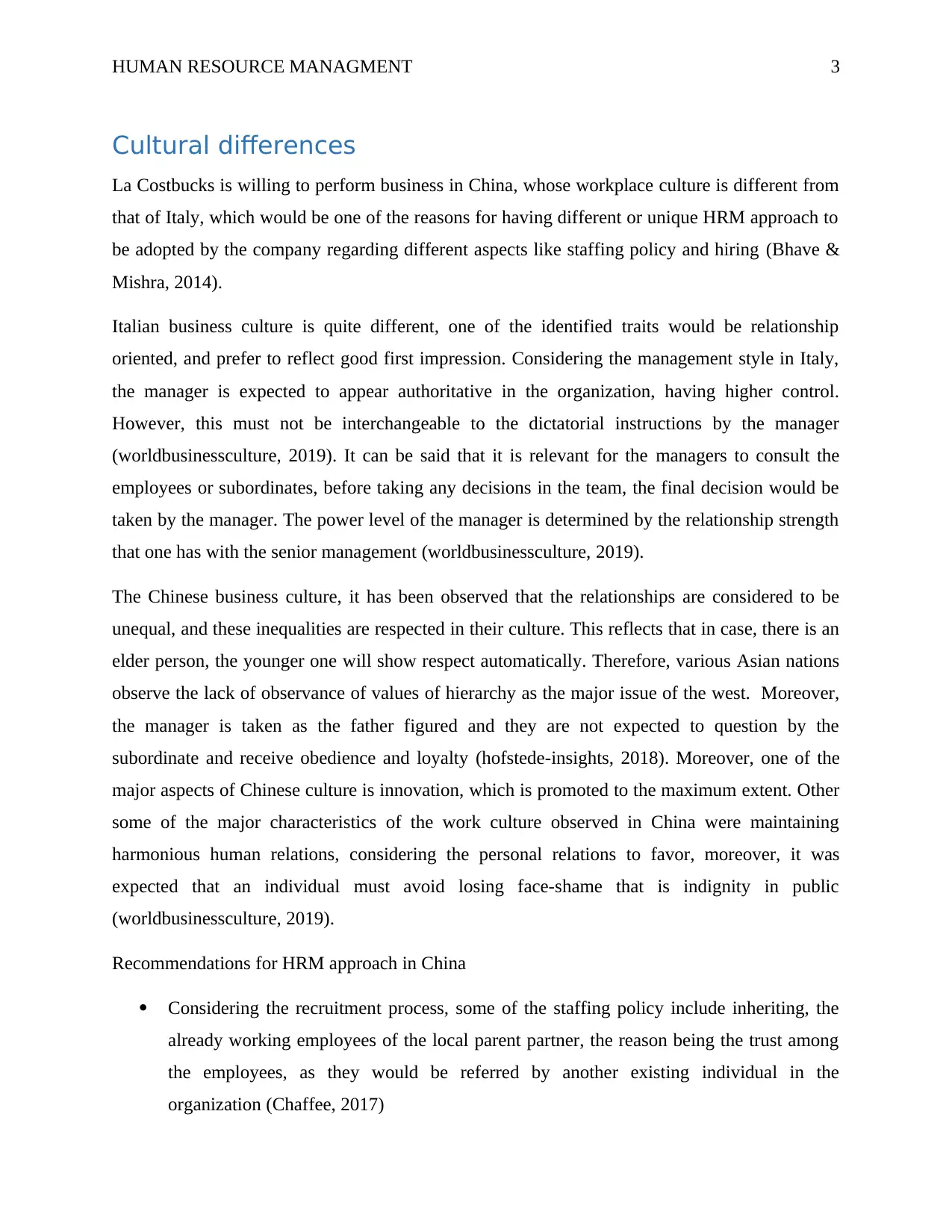
HUMAN RESOURCE MANAGMENT 3
Cultural differences
La Costbucks is willing to perform business in China, whose workplace culture is different from
that of Italy, which would be one of the reasons for having different or unique HRM approach to
be adopted by the company regarding different aspects like staffing policy and hiring (Bhave &
Mishra, 2014).
Italian business culture is quite different, one of the identified traits would be relationship
oriented, and prefer to reflect good first impression. Considering the management style in Italy,
the manager is expected to appear authoritative in the organization, having higher control.
However, this must not be interchangeable to the dictatorial instructions by the manager
(worldbusinessculture, 2019). It can be said that it is relevant for the managers to consult the
employees or subordinates, before taking any decisions in the team, the final decision would be
taken by the manager. The power level of the manager is determined by the relationship strength
that one has with the senior management (worldbusinessculture, 2019).
The Chinese business culture, it has been observed that the relationships are considered to be
unequal, and these inequalities are respected in their culture. This reflects that in case, there is an
elder person, the younger one will show respect automatically. Therefore, various Asian nations
observe the lack of observance of values of hierarchy as the major issue of the west. Moreover,
the manager is taken as the father figured and they are not expected to question by the
subordinate and receive obedience and loyalty (hofstede-insights, 2018). Moreover, one of the
major aspects of Chinese culture is innovation, which is promoted to the maximum extent. Other
some of the major characteristics of the work culture observed in China were maintaining
harmonious human relations, considering the personal relations to favor, moreover, it was
expected that an individual must avoid losing face-shame that is indignity in public
(worldbusinessculture, 2019).
Recommendations for HRM approach in China
Considering the recruitment process, some of the staffing policy include inheriting, the
already working employees of the local parent partner, the reason being the trust among
the employees, as they would be referred by another existing individual in the
organization (Chaffee, 2017)
Cultural differences
La Costbucks is willing to perform business in China, whose workplace culture is different from
that of Italy, which would be one of the reasons for having different or unique HRM approach to
be adopted by the company regarding different aspects like staffing policy and hiring (Bhave &
Mishra, 2014).
Italian business culture is quite different, one of the identified traits would be relationship
oriented, and prefer to reflect good first impression. Considering the management style in Italy,
the manager is expected to appear authoritative in the organization, having higher control.
However, this must not be interchangeable to the dictatorial instructions by the manager
(worldbusinessculture, 2019). It can be said that it is relevant for the managers to consult the
employees or subordinates, before taking any decisions in the team, the final decision would be
taken by the manager. The power level of the manager is determined by the relationship strength
that one has with the senior management (worldbusinessculture, 2019).
The Chinese business culture, it has been observed that the relationships are considered to be
unequal, and these inequalities are respected in their culture. This reflects that in case, there is an
elder person, the younger one will show respect automatically. Therefore, various Asian nations
observe the lack of observance of values of hierarchy as the major issue of the west. Moreover,
the manager is taken as the father figured and they are not expected to question by the
subordinate and receive obedience and loyalty (hofstede-insights, 2018). Moreover, one of the
major aspects of Chinese culture is innovation, which is promoted to the maximum extent. Other
some of the major characteristics of the work culture observed in China were maintaining
harmonious human relations, considering the personal relations to favor, moreover, it was
expected that an individual must avoid losing face-shame that is indignity in public
(worldbusinessculture, 2019).
Recommendations for HRM approach in China
Considering the recruitment process, some of the staffing policy include inheriting, the
already working employees of the local parent partner, the reason being the trust among
the employees, as they would be referred by another existing individual in the
organization (Chaffee, 2017)
Paraphrase This Document
Need a fresh take? Get an instant paraphrase of this document with our AI Paraphraser
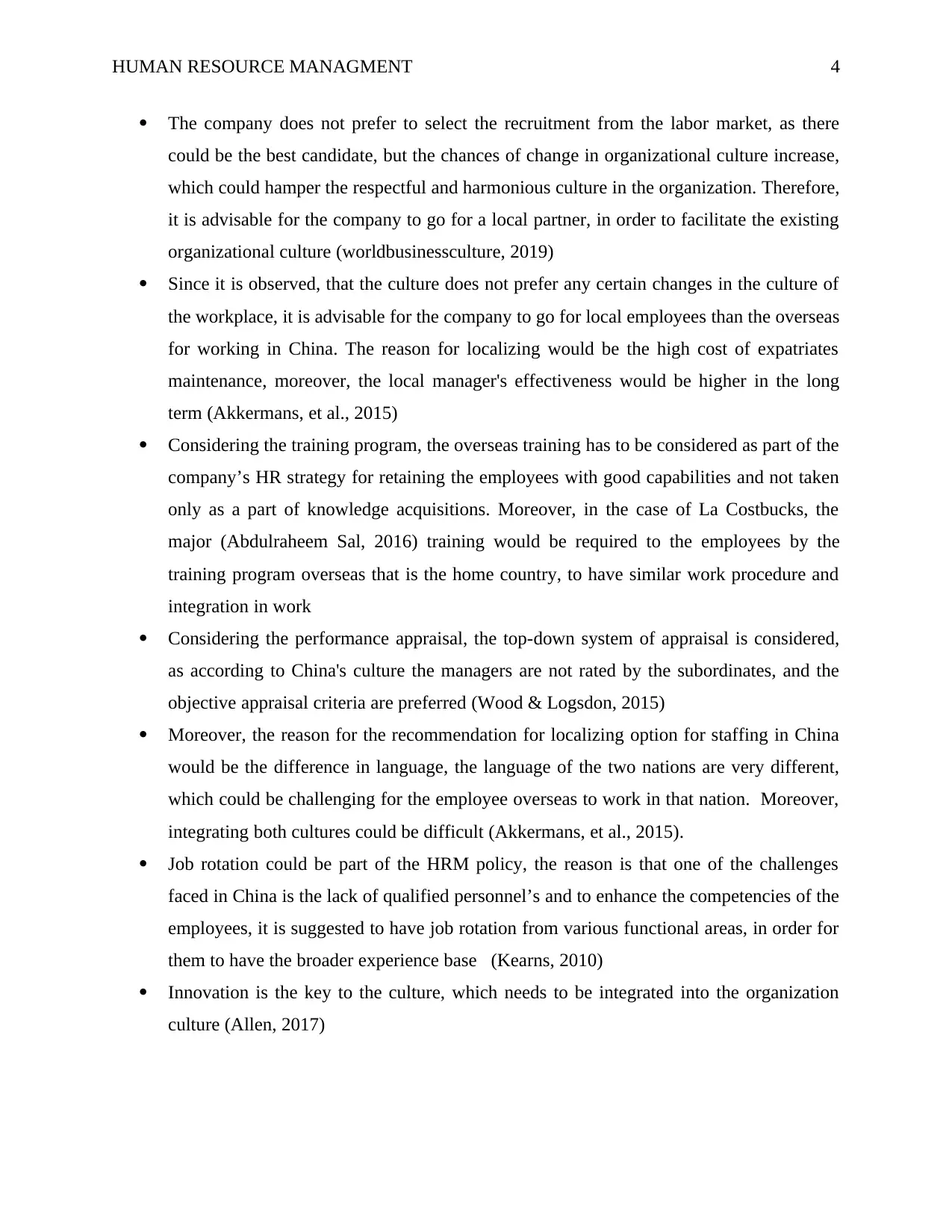
HUMAN RESOURCE MANAGMENT 4
The company does not prefer to select the recruitment from the labor market, as there
could be the best candidate, but the chances of change in organizational culture increase,
which could hamper the respectful and harmonious culture in the organization. Therefore,
it is advisable for the company to go for a local partner, in order to facilitate the existing
organizational culture (worldbusinessculture, 2019)
Since it is observed, that the culture does not prefer any certain changes in the culture of
the workplace, it is advisable for the company to go for local employees than the overseas
for working in China. The reason for localizing would be the high cost of expatriates
maintenance, moreover, the local manager's effectiveness would be higher in the long
term (Akkermans, et al., 2015)
Considering the training program, the overseas training has to be considered as part of the
company’s HR strategy for retaining the employees with good capabilities and not taken
only as a part of knowledge acquisitions. Moreover, in the case of La Costbucks, the
major (Abdulraheem Sal, 2016) training would be required to the employees by the
training program overseas that is the home country, to have similar work procedure and
integration in work
Considering the performance appraisal, the top-down system of appraisal is considered,
as according to China's culture the managers are not rated by the subordinates, and the
objective appraisal criteria are preferred (Wood & Logsdon, 2015)
Moreover, the reason for the recommendation for localizing option for staffing in China
would be the difference in language, the language of the two nations are very different,
which could be challenging for the employee overseas to work in that nation. Moreover,
integrating both cultures could be difficult (Akkermans, et al., 2015).
Job rotation could be part of the HRM policy, the reason is that one of the challenges
faced in China is the lack of qualified personnel’s and to enhance the competencies of the
employees, it is suggested to have job rotation from various functional areas, in order for
them to have the broader experience base (Kearns, 2010)
Innovation is the key to the culture, which needs to be integrated into the organization
culture (Allen, 2017)
The company does not prefer to select the recruitment from the labor market, as there
could be the best candidate, but the chances of change in organizational culture increase,
which could hamper the respectful and harmonious culture in the organization. Therefore,
it is advisable for the company to go for a local partner, in order to facilitate the existing
organizational culture (worldbusinessculture, 2019)
Since it is observed, that the culture does not prefer any certain changes in the culture of
the workplace, it is advisable for the company to go for local employees than the overseas
for working in China. The reason for localizing would be the high cost of expatriates
maintenance, moreover, the local manager's effectiveness would be higher in the long
term (Akkermans, et al., 2015)
Considering the training program, the overseas training has to be considered as part of the
company’s HR strategy for retaining the employees with good capabilities and not taken
only as a part of knowledge acquisitions. Moreover, in the case of La Costbucks, the
major (Abdulraheem Sal, 2016) training would be required to the employees by the
training program overseas that is the home country, to have similar work procedure and
integration in work
Considering the performance appraisal, the top-down system of appraisal is considered,
as according to China's culture the managers are not rated by the subordinates, and the
objective appraisal criteria are preferred (Wood & Logsdon, 2015)
Moreover, the reason for the recommendation for localizing option for staffing in China
would be the difference in language, the language of the two nations are very different,
which could be challenging for the employee overseas to work in that nation. Moreover,
integrating both cultures could be difficult (Akkermans, et al., 2015).
Job rotation could be part of the HRM policy, the reason is that one of the challenges
faced in China is the lack of qualified personnel’s and to enhance the competencies of the
employees, it is suggested to have job rotation from various functional areas, in order for
them to have the broader experience base (Kearns, 2010)
Innovation is the key to the culture, which needs to be integrated into the organization
culture (Allen, 2017)
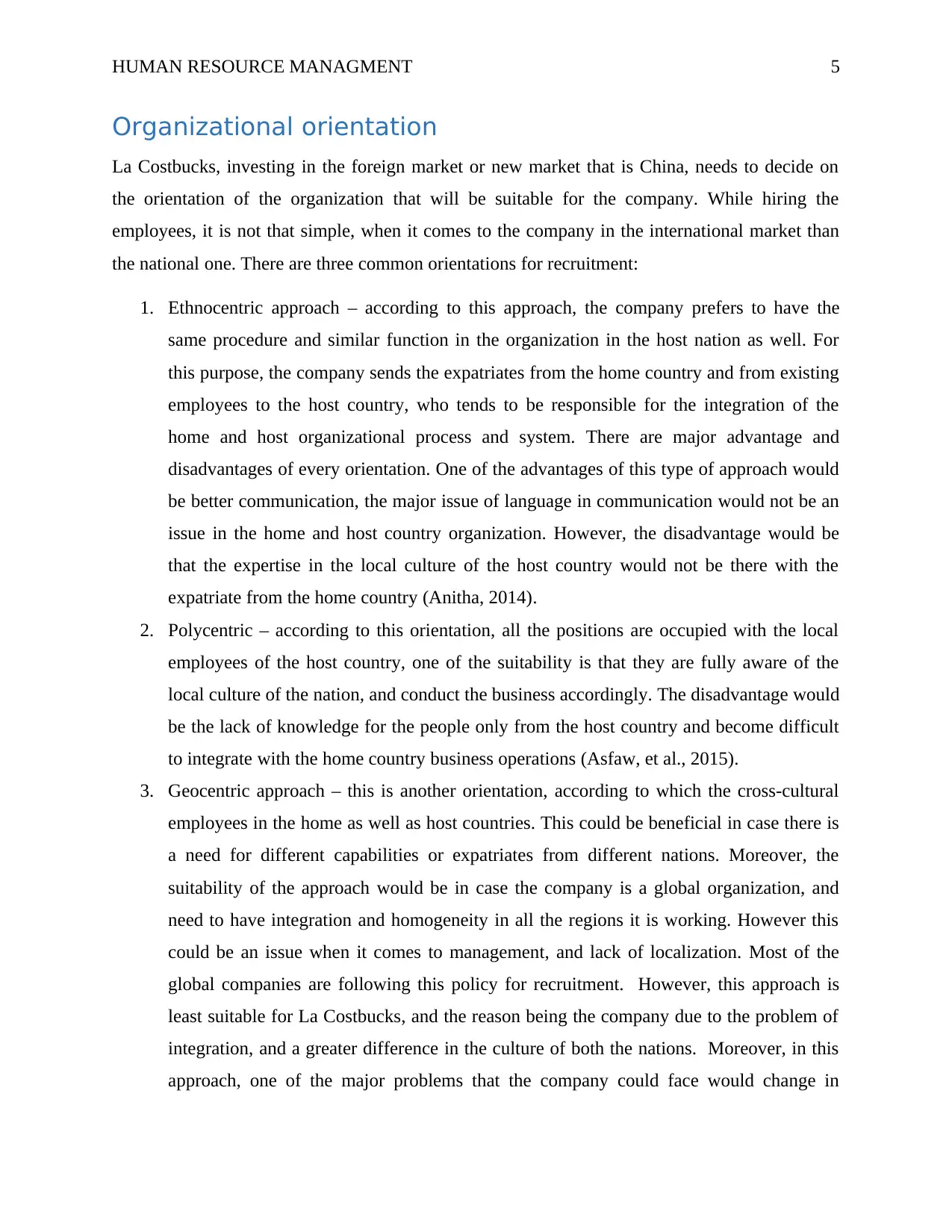
HUMAN RESOURCE MANAGMENT 5
Organizational orientation
La Costbucks, investing in the foreign market or new market that is China, needs to decide on
the orientation of the organization that will be suitable for the company. While hiring the
employees, it is not that simple, when it comes to the company in the international market than
the national one. There are three common orientations for recruitment:
1. Ethnocentric approach – according to this approach, the company prefers to have the
same procedure and similar function in the organization in the host nation as well. For
this purpose, the company sends the expatriates from the home country and from existing
employees to the host country, who tends to be responsible for the integration of the
home and host organizational process and system. There are major advantage and
disadvantages of every orientation. One of the advantages of this type of approach would
be better communication, the major issue of language in communication would not be an
issue in the home and host country organization. However, the disadvantage would be
that the expertise in the local culture of the host country would not be there with the
expatriate from the home country (Anitha, 2014).
2. Polycentric – according to this orientation, all the positions are occupied with the local
employees of the host country, one of the suitability is that they are fully aware of the
local culture of the nation, and conduct the business accordingly. The disadvantage would
be the lack of knowledge for the people only from the host country and become difficult
to integrate with the home country business operations (Asfaw, et al., 2015).
3. Geocentric approach – this is another orientation, according to which the cross-cultural
employees in the home as well as host countries. This could be beneficial in case there is
a need for different capabilities or expatriates from different nations. Moreover, the
suitability of the approach would be in case the company is a global organization, and
need to have integration and homogeneity in all the regions it is working. However this
could be an issue when it comes to management, and lack of localization. Most of the
global companies are following this policy for recruitment. However, this approach is
least suitable for La Costbucks, and the reason being the company due to the problem of
integration, and a greater difference in the culture of both the nations. Moreover, in this
approach, one of the major problems that the company could face would change in
Organizational orientation
La Costbucks, investing in the foreign market or new market that is China, needs to decide on
the orientation of the organization that will be suitable for the company. While hiring the
employees, it is not that simple, when it comes to the company in the international market than
the national one. There are three common orientations for recruitment:
1. Ethnocentric approach – according to this approach, the company prefers to have the
same procedure and similar function in the organization in the host nation as well. For
this purpose, the company sends the expatriates from the home country and from existing
employees to the host country, who tends to be responsible for the integration of the
home and host organizational process and system. There are major advantage and
disadvantages of every orientation. One of the advantages of this type of approach would
be better communication, the major issue of language in communication would not be an
issue in the home and host country organization. However, the disadvantage would be
that the expertise in the local culture of the host country would not be there with the
expatriate from the home country (Anitha, 2014).
2. Polycentric – according to this orientation, all the positions are occupied with the local
employees of the host country, one of the suitability is that they are fully aware of the
local culture of the nation, and conduct the business accordingly. The disadvantage would
be the lack of knowledge for the people only from the host country and become difficult
to integrate with the home country business operations (Asfaw, et al., 2015).
3. Geocentric approach – this is another orientation, according to which the cross-cultural
employees in the home as well as host countries. This could be beneficial in case there is
a need for different capabilities or expatriates from different nations. Moreover, the
suitability of the approach would be in case the company is a global organization, and
need to have integration and homogeneity in all the regions it is working. However this
could be an issue when it comes to management, and lack of localization. Most of the
global companies are following this policy for recruitment. However, this approach is
least suitable for La Costbucks, and the reason being the company due to the problem of
integration, and a greater difference in the culture of both the nations. Moreover, in this
approach, one of the major problems that the company could face would change in
⊘ This is a preview!⊘
Do you want full access?
Subscribe today to unlock all pages.

Trusted by 1+ million students worldwide
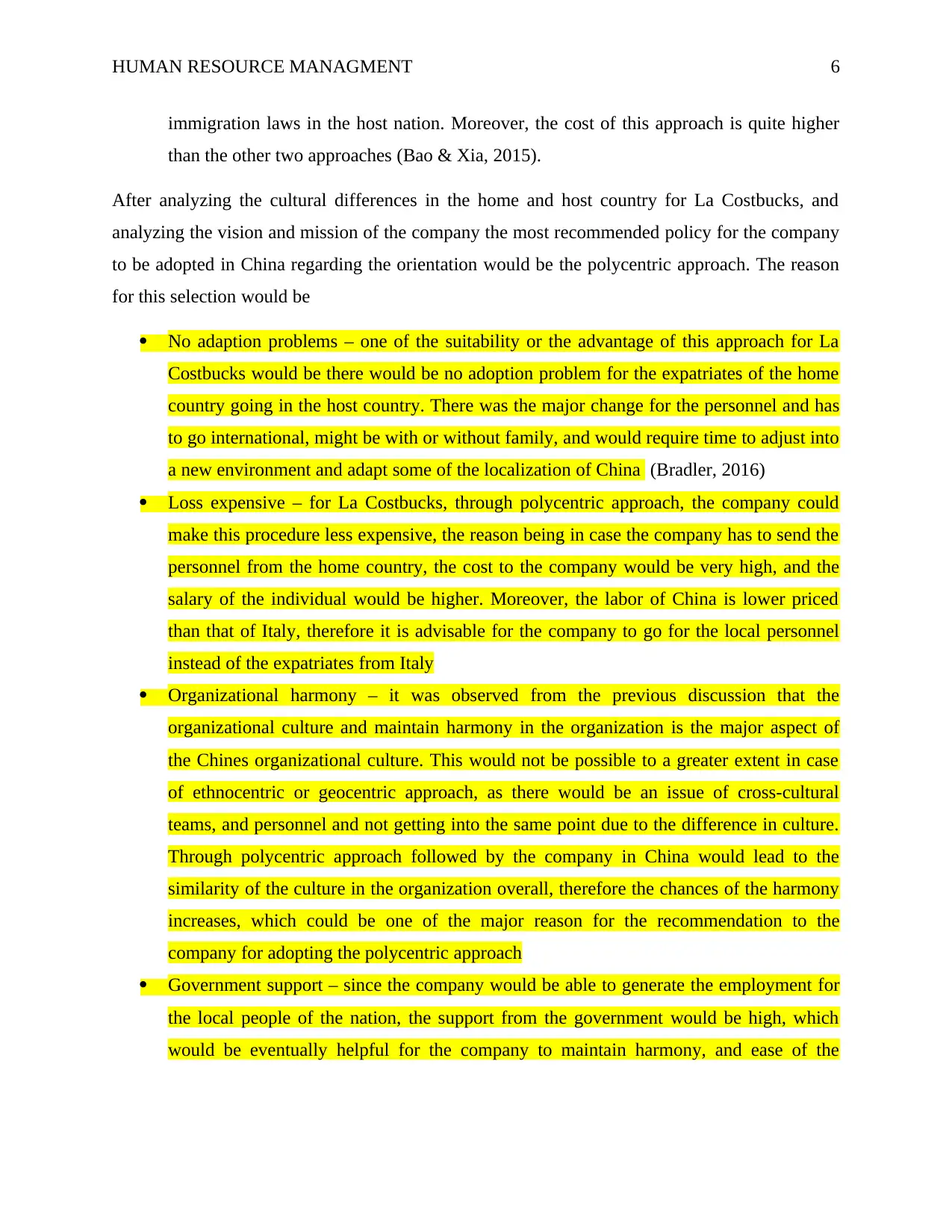
HUMAN RESOURCE MANAGMENT 6
immigration laws in the host nation. Moreover, the cost of this approach is quite higher
than the other two approaches (Bao & Xia, 2015).
After analyzing the cultural differences in the home and host country for La Costbucks, and
analyzing the vision and mission of the company the most recommended policy for the company
to be adopted in China regarding the orientation would be the polycentric approach. The reason
for this selection would be
No adaption problems – one of the suitability or the advantage of this approach for La
Costbucks would be there would be no adoption problem for the expatriates of the home
country going in the host country. There was the major change for the personnel and has
to go international, might be with or without family, and would require time to adjust into
a new environment and adapt some of the localization of China (Bradler, 2016)
Loss expensive – for La Costbucks, through polycentric approach, the company could
make this procedure less expensive, the reason being in case the company has to send the
personnel from the home country, the cost to the company would be very high, and the
salary of the individual would be higher. Moreover, the labor of China is lower priced
than that of Italy, therefore it is advisable for the company to go for the local personnel
instead of the expatriates from Italy
Organizational harmony – it was observed from the previous discussion that the
organizational culture and maintain harmony in the organization is the major aspect of
the Chines organizational culture. This would not be possible to a greater extent in case
of ethnocentric or geocentric approach, as there would be an issue of cross-cultural
teams, and personnel and not getting into the same point due to the difference in culture.
Through polycentric approach followed by the company in China would lead to the
similarity of the culture in the organization overall, therefore the chances of the harmony
increases, which could be one of the major reason for the recommendation to the
company for adopting the polycentric approach
Government support – since the company would be able to generate the employment for
the local people of the nation, the support from the government would be high, which
would be eventually helpful for the company to maintain harmony, and ease of the
immigration laws in the host nation. Moreover, the cost of this approach is quite higher
than the other two approaches (Bao & Xia, 2015).
After analyzing the cultural differences in the home and host country for La Costbucks, and
analyzing the vision and mission of the company the most recommended policy for the company
to be adopted in China regarding the orientation would be the polycentric approach. The reason
for this selection would be
No adaption problems – one of the suitability or the advantage of this approach for La
Costbucks would be there would be no adoption problem for the expatriates of the home
country going in the host country. There was the major change for the personnel and has
to go international, might be with or without family, and would require time to adjust into
a new environment and adapt some of the localization of China (Bradler, 2016)
Loss expensive – for La Costbucks, through polycentric approach, the company could
make this procedure less expensive, the reason being in case the company has to send the
personnel from the home country, the cost to the company would be very high, and the
salary of the individual would be higher. Moreover, the labor of China is lower priced
than that of Italy, therefore it is advisable for the company to go for the local personnel
instead of the expatriates from Italy
Organizational harmony – it was observed from the previous discussion that the
organizational culture and maintain harmony in the organization is the major aspect of
the Chines organizational culture. This would not be possible to a greater extent in case
of ethnocentric or geocentric approach, as there would be an issue of cross-cultural
teams, and personnel and not getting into the same point due to the difference in culture.
Through polycentric approach followed by the company in China would lead to the
similarity of the culture in the organization overall, therefore the chances of the harmony
increases, which could be one of the major reason for the recommendation to the
company for adopting the polycentric approach
Government support – since the company would be able to generate the employment for
the local people of the nation, the support from the government would be high, which
would be eventually helpful for the company to maintain harmony, and ease of the
Paraphrase This Document
Need a fresh take? Get an instant paraphrase of this document with our AI Paraphraser
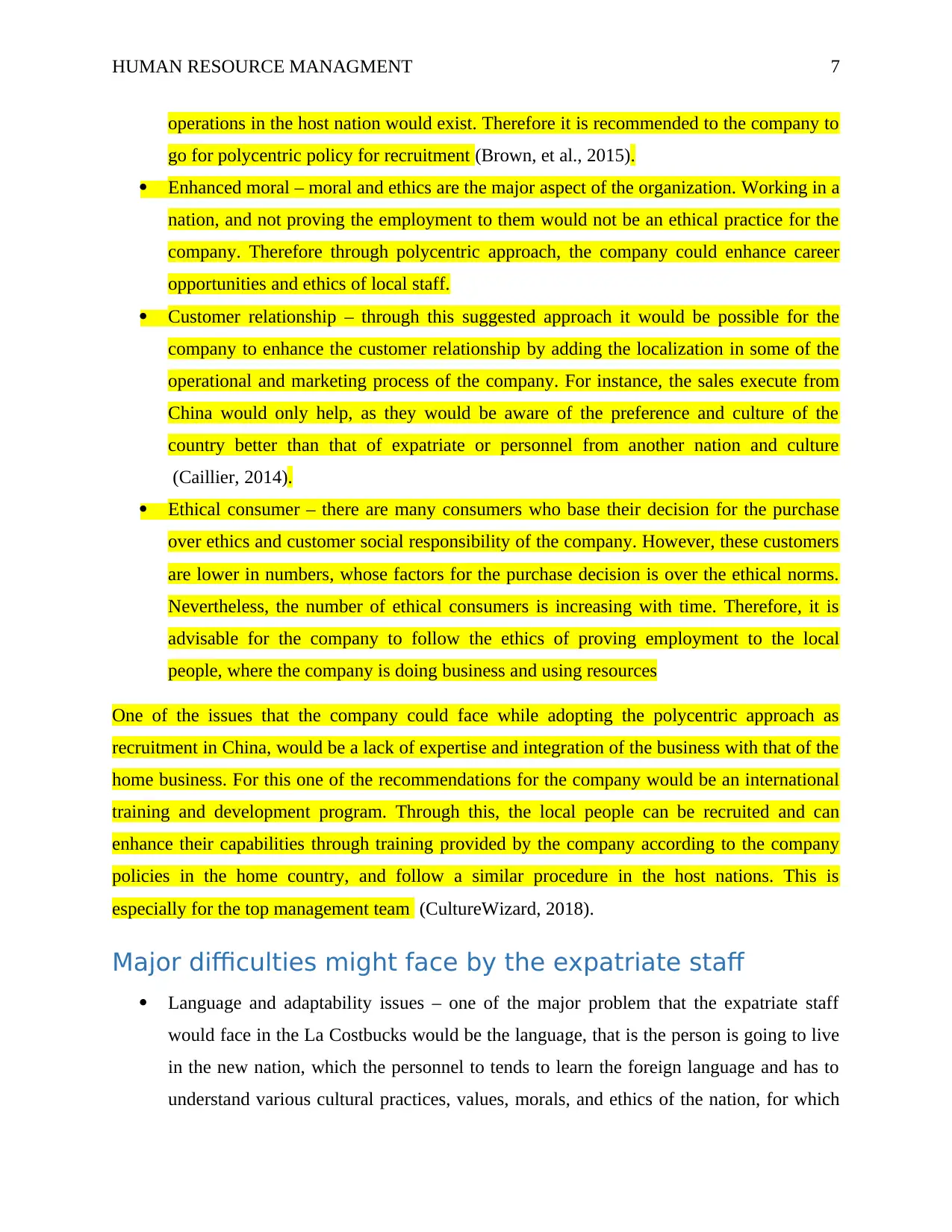
HUMAN RESOURCE MANAGMENT 7
operations in the host nation would exist. Therefore it is recommended to the company to
go for polycentric policy for recruitment (Brown, et al., 2015).
Enhanced moral – moral and ethics are the major aspect of the organization. Working in a
nation, and not proving the employment to them would not be an ethical practice for the
company. Therefore through polycentric approach, the company could enhance career
opportunities and ethics of local staff.
Customer relationship – through this suggested approach it would be possible for the
company to enhance the customer relationship by adding the localization in some of the
operational and marketing process of the company. For instance, the sales execute from
China would only help, as they would be aware of the preference and culture of the
country better than that of expatriate or personnel from another nation and culture
(Caillier, 2014).
Ethical consumer – there are many consumers who base their decision for the purchase
over ethics and customer social responsibility of the company. However, these customers
are lower in numbers, whose factors for the purchase decision is over the ethical norms.
Nevertheless, the number of ethical consumers is increasing with time. Therefore, it is
advisable for the company to follow the ethics of proving employment to the local
people, where the company is doing business and using resources
One of the issues that the company could face while adopting the polycentric approach as
recruitment in China, would be a lack of expertise and integration of the business with that of the
home business. For this one of the recommendations for the company would be an international
training and development program. Through this, the local people can be recruited and can
enhance their capabilities through training provided by the company according to the company
policies in the home country, and follow a similar procedure in the host nations. This is
especially for the top management team (CultureWizard, 2018).
Major difficulties might face by the expatriate staff
Language and adaptability issues – one of the major problem that the expatriate staff
would face in the La Costbucks would be the language, that is the person is going to live
in the new nation, which the personnel to tends to learn the foreign language and has to
understand various cultural practices, values, morals, and ethics of the nation, for which
operations in the host nation would exist. Therefore it is recommended to the company to
go for polycentric policy for recruitment (Brown, et al., 2015).
Enhanced moral – moral and ethics are the major aspect of the organization. Working in a
nation, and not proving the employment to them would not be an ethical practice for the
company. Therefore through polycentric approach, the company could enhance career
opportunities and ethics of local staff.
Customer relationship – through this suggested approach it would be possible for the
company to enhance the customer relationship by adding the localization in some of the
operational and marketing process of the company. For instance, the sales execute from
China would only help, as they would be aware of the preference and culture of the
country better than that of expatriate or personnel from another nation and culture
(Caillier, 2014).
Ethical consumer – there are many consumers who base their decision for the purchase
over ethics and customer social responsibility of the company. However, these customers
are lower in numbers, whose factors for the purchase decision is over the ethical norms.
Nevertheless, the number of ethical consumers is increasing with time. Therefore, it is
advisable for the company to follow the ethics of proving employment to the local
people, where the company is doing business and using resources
One of the issues that the company could face while adopting the polycentric approach as
recruitment in China, would be a lack of expertise and integration of the business with that of the
home business. For this one of the recommendations for the company would be an international
training and development program. Through this, the local people can be recruited and can
enhance their capabilities through training provided by the company according to the company
policies in the home country, and follow a similar procedure in the host nations. This is
especially for the top management team (CultureWizard, 2018).
Major difficulties might face by the expatriate staff
Language and adaptability issues – one of the major problem that the expatriate staff
would face in the La Costbucks would be the language, that is the person is going to live
in the new nation, which the personnel to tends to learn the foreign language and has to
understand various cultural practices, values, morals, and ethics of the nation, for which
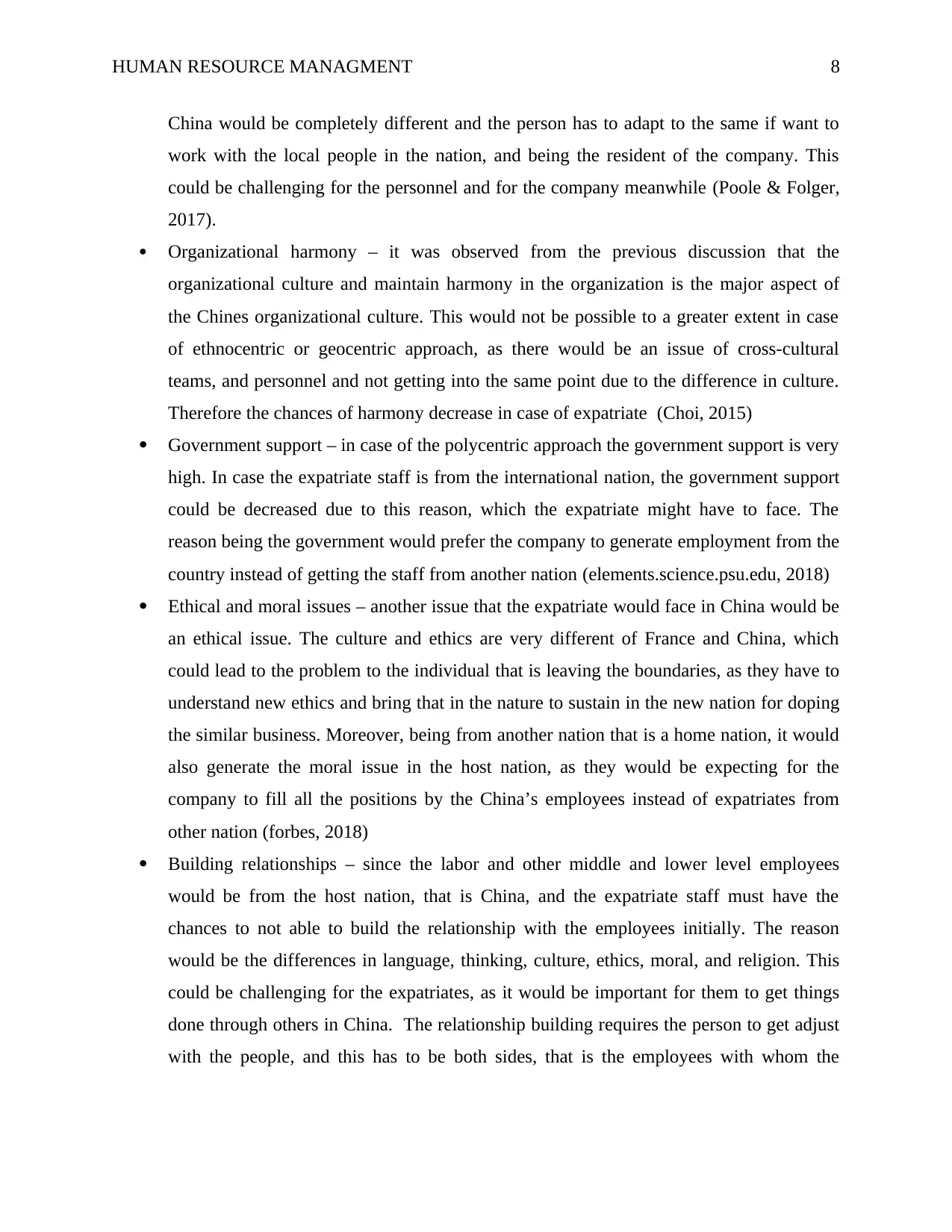
HUMAN RESOURCE MANAGMENT 8
China would be completely different and the person has to adapt to the same if want to
work with the local people in the nation, and being the resident of the company. This
could be challenging for the personnel and for the company meanwhile (Poole & Folger,
2017).
Organizational harmony – it was observed from the previous discussion that the
organizational culture and maintain harmony in the organization is the major aspect of
the Chines organizational culture. This would not be possible to a greater extent in case
of ethnocentric or geocentric approach, as there would be an issue of cross-cultural
teams, and personnel and not getting into the same point due to the difference in culture.
Therefore the chances of harmony decrease in case of expatriate (Choi, 2015)
Government support – in case of the polycentric approach the government support is very
high. In case the expatriate staff is from the international nation, the government support
could be decreased due to this reason, which the expatriate might have to face. The
reason being the government would prefer the company to generate employment from the
country instead of getting the staff from another nation (elements.science.psu.edu, 2018)
Ethical and moral issues – another issue that the expatriate would face in China would be
an ethical issue. The culture and ethics are very different of France and China, which
could lead to the problem to the individual that is leaving the boundaries, as they have to
understand new ethics and bring that in the nature to sustain in the new nation for doping
the similar business. Moreover, being from another nation that is a home nation, it would
also generate the moral issue in the host nation, as they would be expecting for the
company to fill all the positions by the China’s employees instead of expatriates from
other nation (forbes, 2018)
Building relationships – since the labor and other middle and lower level employees
would be from the host nation, that is China, and the expatriate staff must have the
chances to not able to build the relationship with the employees initially. The reason
would be the differences in language, thinking, culture, ethics, moral, and religion. This
could be challenging for the expatriates, as it would be important for them to get things
done through others in China. The relationship building requires the person to get adjust
with the people, and this has to be both sides, that is the employees with whom the
China would be completely different and the person has to adapt to the same if want to
work with the local people in the nation, and being the resident of the company. This
could be challenging for the personnel and for the company meanwhile (Poole & Folger,
2017).
Organizational harmony – it was observed from the previous discussion that the
organizational culture and maintain harmony in the organization is the major aspect of
the Chines organizational culture. This would not be possible to a greater extent in case
of ethnocentric or geocentric approach, as there would be an issue of cross-cultural
teams, and personnel and not getting into the same point due to the difference in culture.
Therefore the chances of harmony decrease in case of expatriate (Choi, 2015)
Government support – in case of the polycentric approach the government support is very
high. In case the expatriate staff is from the international nation, the government support
could be decreased due to this reason, which the expatriate might have to face. The
reason being the government would prefer the company to generate employment from the
country instead of getting the staff from another nation (elements.science.psu.edu, 2018)
Ethical and moral issues – another issue that the expatriate would face in China would be
an ethical issue. The culture and ethics are very different of France and China, which
could lead to the problem to the individual that is leaving the boundaries, as they have to
understand new ethics and bring that in the nature to sustain in the new nation for doping
the similar business. Moreover, being from another nation that is a home nation, it would
also generate the moral issue in the host nation, as they would be expecting for the
company to fill all the positions by the China’s employees instead of expatriates from
other nation (forbes, 2018)
Building relationships – since the labor and other middle and lower level employees
would be from the host nation, that is China, and the expatriate staff must have the
chances to not able to build the relationship with the employees initially. The reason
would be the differences in language, thinking, culture, ethics, moral, and religion. This
could be challenging for the expatriates, as it would be important for them to get things
done through others in China. The relationship building requires the person to get adjust
with the people, and this has to be both sides, that is the employees with whom the
⊘ This is a preview!⊘
Do you want full access?
Subscribe today to unlock all pages.

Trusted by 1+ million students worldwide
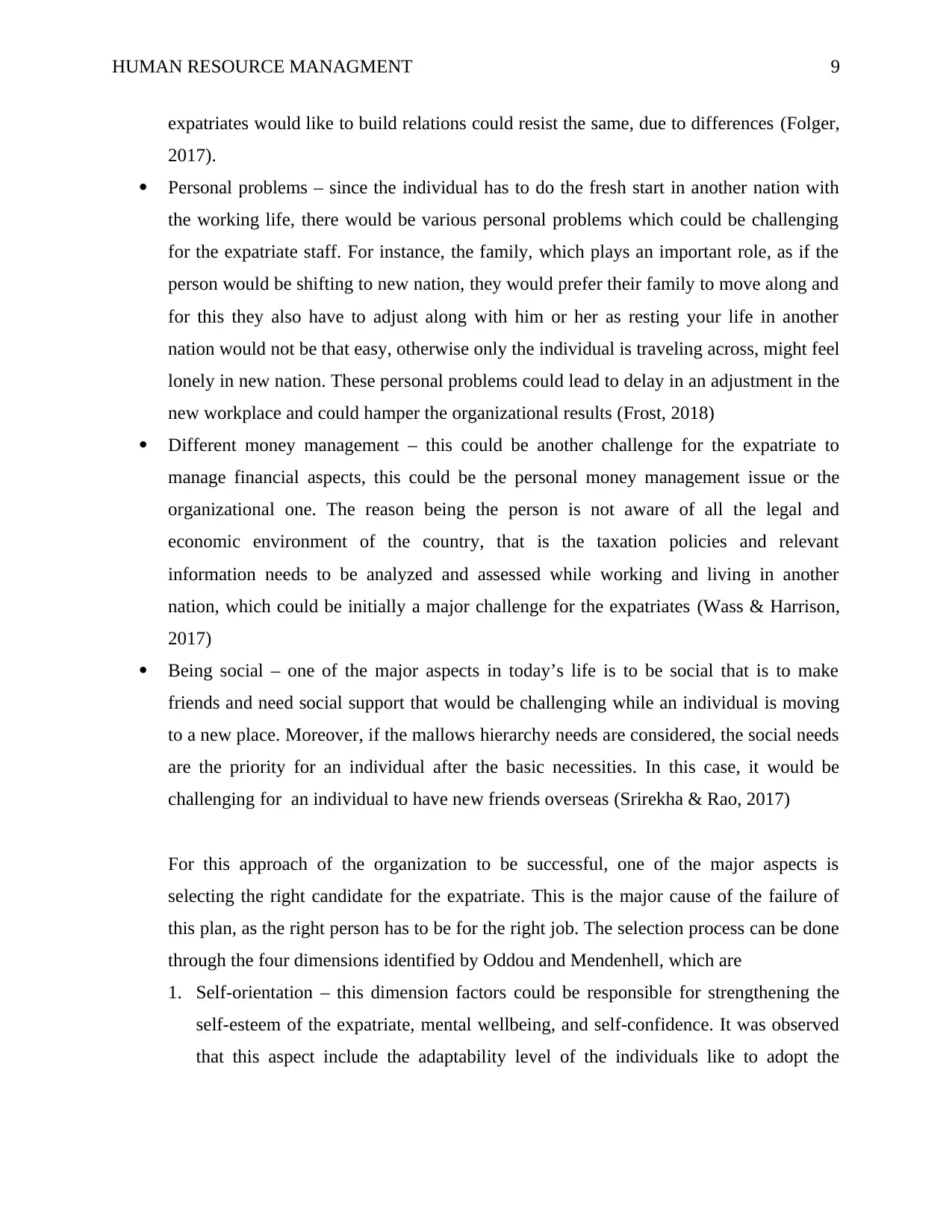
HUMAN RESOURCE MANAGMENT 9
expatriates would like to build relations could resist the same, due to differences (Folger,
2017).
Personal problems – since the individual has to do the fresh start in another nation with
the working life, there would be various personal problems which could be challenging
for the expatriate staff. For instance, the family, which plays an important role, as if the
person would be shifting to new nation, they would prefer their family to move along and
for this they also have to adjust along with him or her as resting your life in another
nation would not be that easy, otherwise only the individual is traveling across, might feel
lonely in new nation. These personal problems could lead to delay in an adjustment in the
new workplace and could hamper the organizational results (Frost, 2018)
Different money management – this could be another challenge for the expatriate to
manage financial aspects, this could be the personal money management issue or the
organizational one. The reason being the person is not aware of all the legal and
economic environment of the country, that is the taxation policies and relevant
information needs to be analyzed and assessed while working and living in another
nation, which could be initially a major challenge for the expatriates (Wass & Harrison,
2017)
Being social – one of the major aspects in today’s life is to be social that is to make
friends and need social support that would be challenging while an individual is moving
to a new place. Moreover, if the mallows hierarchy needs are considered, the social needs
are the priority for an individual after the basic necessities. In this case, it would be
challenging for an individual to have new friends overseas (Srirekha & Rao, 2017)
For this approach of the organization to be successful, one of the major aspects is
selecting the right candidate for the expatriate. This is the major cause of the failure of
this plan, as the right person has to be for the right job. The selection process can be done
through the four dimensions identified by Oddou and Mendenhell, which are
1. Self-orientation – this dimension factors could be responsible for strengthening the
self-esteem of the expatriate, mental wellbeing, and self-confidence. It was observed
that this aspect include the adaptability level of the individuals like to adopt the
expatriates would like to build relations could resist the same, due to differences (Folger,
2017).
Personal problems – since the individual has to do the fresh start in another nation with
the working life, there would be various personal problems which could be challenging
for the expatriate staff. For instance, the family, which plays an important role, as if the
person would be shifting to new nation, they would prefer their family to move along and
for this they also have to adjust along with him or her as resting your life in another
nation would not be that easy, otherwise only the individual is traveling across, might feel
lonely in new nation. These personal problems could lead to delay in an adjustment in the
new workplace and could hamper the organizational results (Frost, 2018)
Different money management – this could be another challenge for the expatriate to
manage financial aspects, this could be the personal money management issue or the
organizational one. The reason being the person is not aware of all the legal and
economic environment of the country, that is the taxation policies and relevant
information needs to be analyzed and assessed while working and living in another
nation, which could be initially a major challenge for the expatriates (Wass & Harrison,
2017)
Being social – one of the major aspects in today’s life is to be social that is to make
friends and need social support that would be challenging while an individual is moving
to a new place. Moreover, if the mallows hierarchy needs are considered, the social needs
are the priority for an individual after the basic necessities. In this case, it would be
challenging for an individual to have new friends overseas (Srirekha & Rao, 2017)
For this approach of the organization to be successful, one of the major aspects is
selecting the right candidate for the expatriate. This is the major cause of the failure of
this plan, as the right person has to be for the right job. The selection process can be done
through the four dimensions identified by Oddou and Mendenhell, which are
1. Self-orientation – this dimension factors could be responsible for strengthening the
self-esteem of the expatriate, mental wellbeing, and self-confidence. It was observed
that this aspect include the adaptability level of the individuals like to adopt the
Paraphrase This Document
Need a fresh take? Get an instant paraphrase of this document with our AI Paraphraser
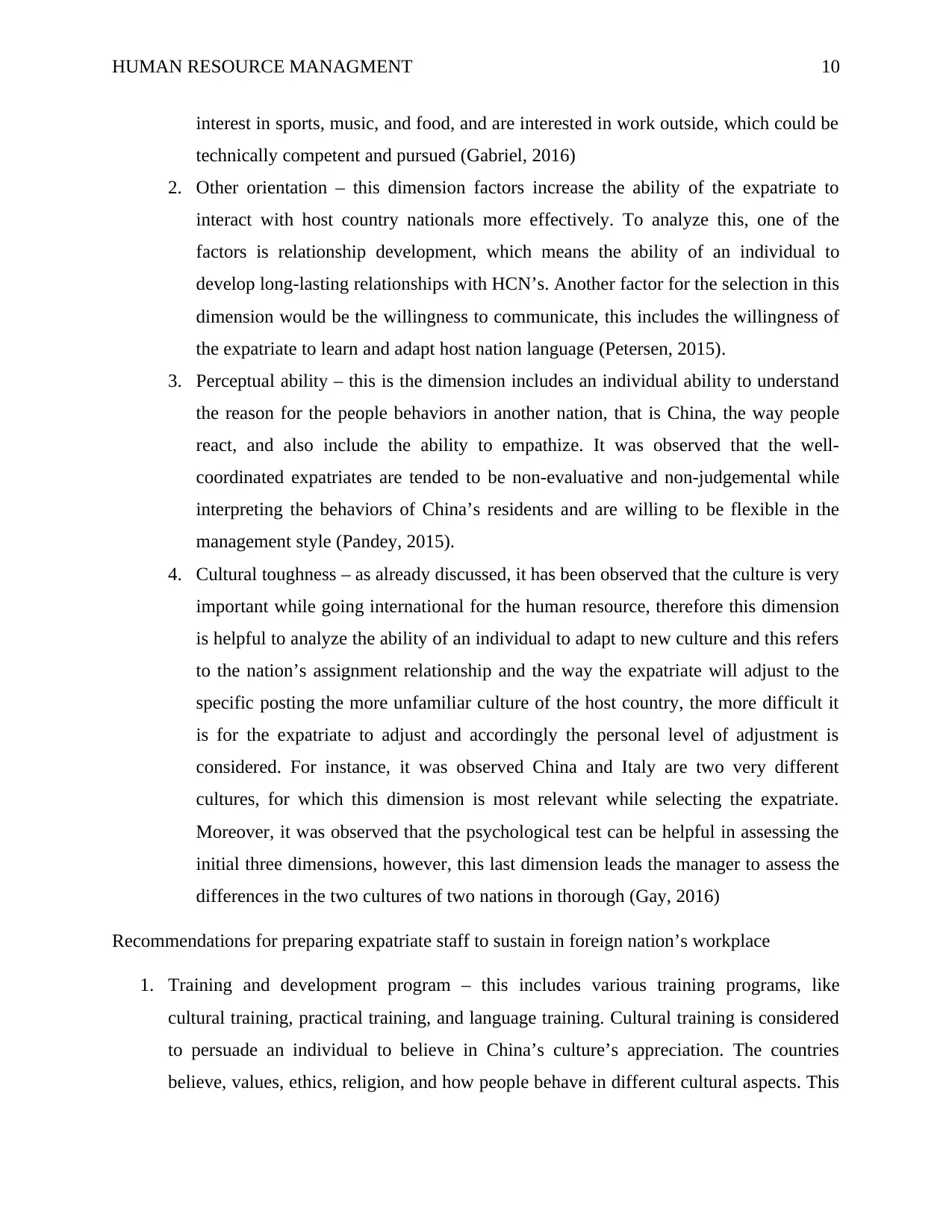
HUMAN RESOURCE MANAGMENT 10
interest in sports, music, and food, and are interested in work outside, which could be
technically competent and pursued (Gabriel, 2016)
2. Other orientation – this dimension factors increase the ability of the expatriate to
interact with host country nationals more effectively. To analyze this, one of the
factors is relationship development, which means the ability of an individual to
develop long-lasting relationships with HCN’s. Another factor for the selection in this
dimension would be the willingness to communicate, this includes the willingness of
the expatriate to learn and adapt host nation language (Petersen, 2015).
3. Perceptual ability – this is the dimension includes an individual ability to understand
the reason for the people behaviors in another nation, that is China, the way people
react, and also include the ability to empathize. It was observed that the well-
coordinated expatriates are tended to be non-evaluative and non-judgemental while
interpreting the behaviors of China’s residents and are willing to be flexible in the
management style (Pandey, 2015).
4. Cultural toughness – as already discussed, it has been observed that the culture is very
important while going international for the human resource, therefore this dimension
is helpful to analyze the ability of an individual to adapt to new culture and this refers
to the nation’s assignment relationship and the way the expatriate will adjust to the
specific posting the more unfamiliar culture of the host country, the more difficult it
is for the expatriate to adjust and accordingly the personal level of adjustment is
considered. For instance, it was observed China and Italy are two very different
cultures, for which this dimension is most relevant while selecting the expatriate.
Moreover, it was observed that the psychological test can be helpful in assessing the
initial three dimensions, however, this last dimension leads the manager to assess the
differences in the two cultures of two nations in thorough (Gay, 2016)
Recommendations for preparing expatriate staff to sustain in foreign nation’s workplace
1. Training and development program – this includes various training programs, like
cultural training, practical training, and language training. Cultural training is considered
to persuade an individual to believe in China’s culture’s appreciation. The countries
believe, values, ethics, religion, and how people behave in different cultural aspects. This
interest in sports, music, and food, and are interested in work outside, which could be
technically competent and pursued (Gabriel, 2016)
2. Other orientation – this dimension factors increase the ability of the expatriate to
interact with host country nationals more effectively. To analyze this, one of the
factors is relationship development, which means the ability of an individual to
develop long-lasting relationships with HCN’s. Another factor for the selection in this
dimension would be the willingness to communicate, this includes the willingness of
the expatriate to learn and adapt host nation language (Petersen, 2015).
3. Perceptual ability – this is the dimension includes an individual ability to understand
the reason for the people behaviors in another nation, that is China, the way people
react, and also include the ability to empathize. It was observed that the well-
coordinated expatriates are tended to be non-evaluative and non-judgemental while
interpreting the behaviors of China’s residents and are willing to be flexible in the
management style (Pandey, 2015).
4. Cultural toughness – as already discussed, it has been observed that the culture is very
important while going international for the human resource, therefore this dimension
is helpful to analyze the ability of an individual to adapt to new culture and this refers
to the nation’s assignment relationship and the way the expatriate will adjust to the
specific posting the more unfamiliar culture of the host country, the more difficult it
is for the expatriate to adjust and accordingly the personal level of adjustment is
considered. For instance, it was observed China and Italy are two very different
cultures, for which this dimension is most relevant while selecting the expatriate.
Moreover, it was observed that the psychological test can be helpful in assessing the
initial three dimensions, however, this last dimension leads the manager to assess the
differences in the two cultures of two nations in thorough (Gay, 2016)
Recommendations for preparing expatriate staff to sustain in foreign nation’s workplace
1. Training and development program – this includes various training programs, like
cultural training, practical training, and language training. Cultural training is considered
to persuade an individual to believe in China’s culture’s appreciation. The countries
believe, values, ethics, religion, and how people behave in different cultural aspects. This
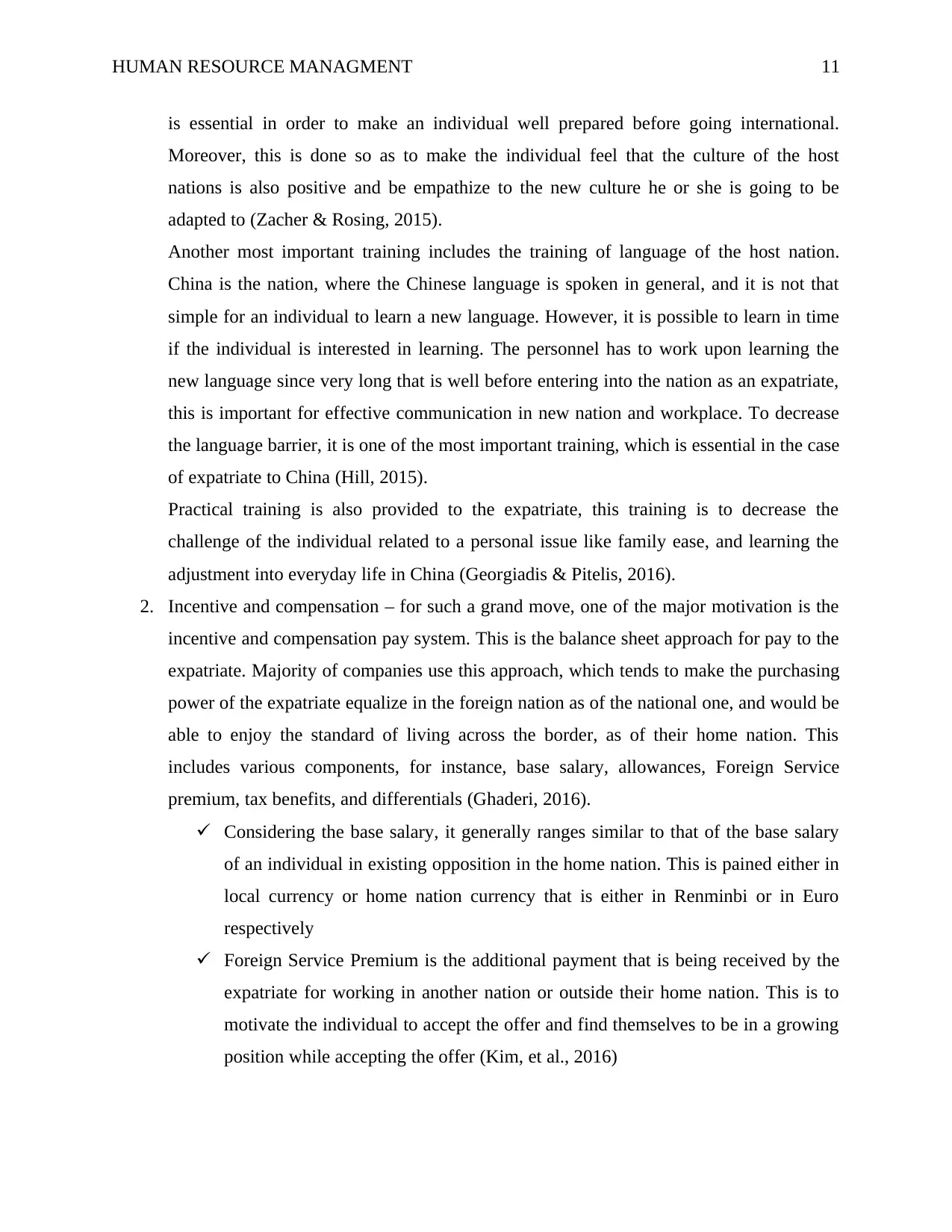
HUMAN RESOURCE MANAGMENT 11
is essential in order to make an individual well prepared before going international.
Moreover, this is done so as to make the individual feel that the culture of the host
nations is also positive and be empathize to the new culture he or she is going to be
adapted to (Zacher & Rosing, 2015).
Another most important training includes the training of language of the host nation.
China is the nation, where the Chinese language is spoken in general, and it is not that
simple for an individual to learn a new language. However, it is possible to learn in time
if the individual is interested in learning. The personnel has to work upon learning the
new language since very long that is well before entering into the nation as an expatriate,
this is important for effective communication in new nation and workplace. To decrease
the language barrier, it is one of the most important training, which is essential in the case
of expatriate to China (Hill, 2015).
Practical training is also provided to the expatriate, this training is to decrease the
challenge of the individual related to a personal issue like family ease, and learning the
adjustment into everyday life in China (Georgiadis & Pitelis, 2016).
2. Incentive and compensation – for such a grand move, one of the major motivation is the
incentive and compensation pay system. This is the balance sheet approach for pay to the
expatriate. Majority of companies use this approach, which tends to make the purchasing
power of the expatriate equalize in the foreign nation as of the national one, and would be
able to enjoy the standard of living across the border, as of their home nation. This
includes various components, for instance, base salary, allowances, Foreign Service
premium, tax benefits, and differentials (Ghaderi, 2016).
Considering the base salary, it generally ranges similar to that of the base salary
of an individual in existing opposition in the home nation. This is pained either in
local currency or home nation currency that is either in Renminbi or in Euro
respectively
Foreign Service Premium is the additional payment that is being received by the
expatriate for working in another nation or outside their home nation. This is to
motivate the individual to accept the offer and find themselves to be in a growing
position while accepting the offer (Kim, et al., 2016)
is essential in order to make an individual well prepared before going international.
Moreover, this is done so as to make the individual feel that the culture of the host
nations is also positive and be empathize to the new culture he or she is going to be
adapted to (Zacher & Rosing, 2015).
Another most important training includes the training of language of the host nation.
China is the nation, where the Chinese language is spoken in general, and it is not that
simple for an individual to learn a new language. However, it is possible to learn in time
if the individual is interested in learning. The personnel has to work upon learning the
new language since very long that is well before entering into the nation as an expatriate,
this is important for effective communication in new nation and workplace. To decrease
the language barrier, it is one of the most important training, which is essential in the case
of expatriate to China (Hill, 2015).
Practical training is also provided to the expatriate, this training is to decrease the
challenge of the individual related to a personal issue like family ease, and learning the
adjustment into everyday life in China (Georgiadis & Pitelis, 2016).
2. Incentive and compensation – for such a grand move, one of the major motivation is the
incentive and compensation pay system. This is the balance sheet approach for pay to the
expatriate. Majority of companies use this approach, which tends to make the purchasing
power of the expatriate equalize in the foreign nation as of the national one, and would be
able to enjoy the standard of living across the border, as of their home nation. This
includes various components, for instance, base salary, allowances, Foreign Service
premium, tax benefits, and differentials (Ghaderi, 2016).
Considering the base salary, it generally ranges similar to that of the base salary
of an individual in existing opposition in the home nation. This is pained either in
local currency or home nation currency that is either in Renminbi or in Euro
respectively
Foreign Service Premium is the additional payment that is being received by the
expatriate for working in another nation or outside their home nation. This is to
motivate the individual to accept the offer and find themselves to be in a growing
position while accepting the offer (Kim, et al., 2016)
⊘ This is a preview!⊘
Do you want full access?
Subscribe today to unlock all pages.

Trusted by 1+ million students worldwide
1 out of 20
Related Documents
Your All-in-One AI-Powered Toolkit for Academic Success.
+13062052269
info@desklib.com
Available 24*7 on WhatsApp / Email
![[object Object]](/_next/static/media/star-bottom.7253800d.svg)
Unlock your academic potential
Copyright © 2020–2026 A2Z Services. All Rights Reserved. Developed and managed by ZUCOL.





